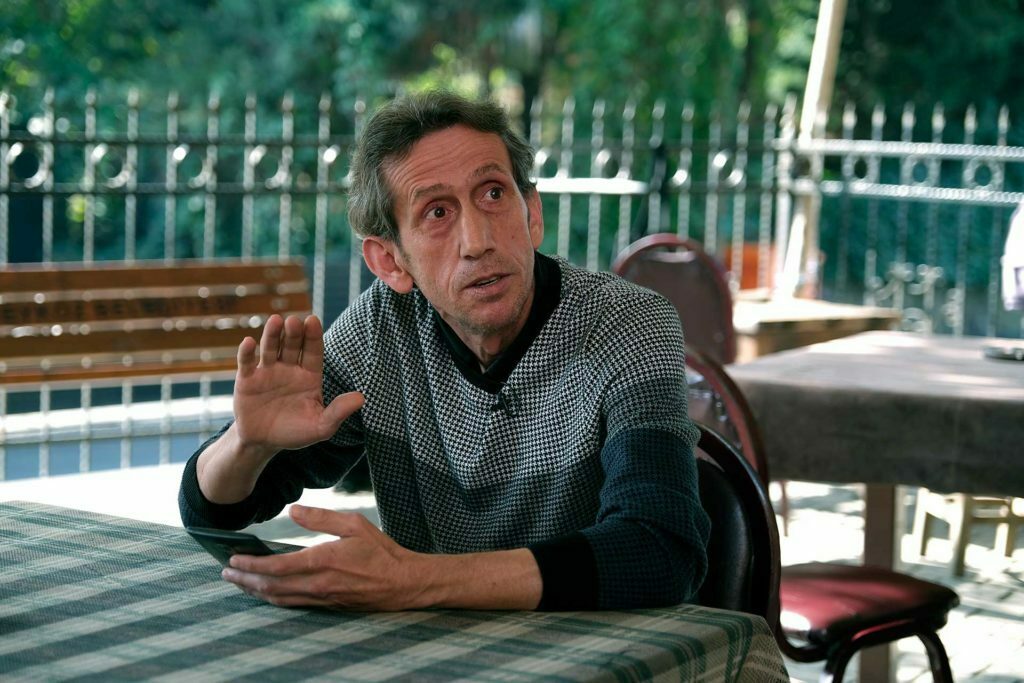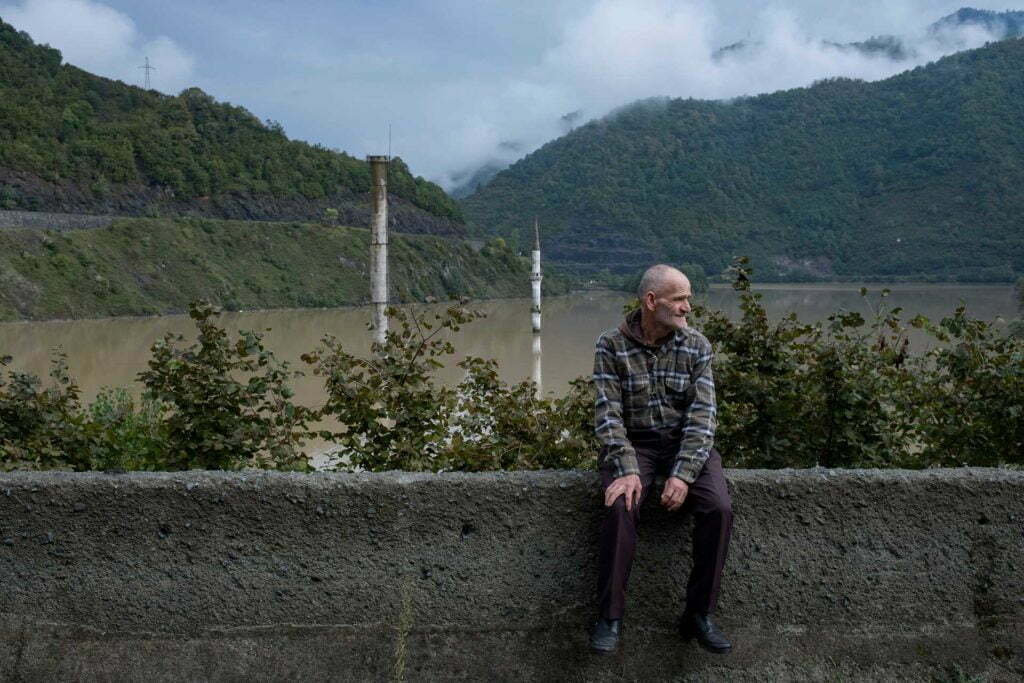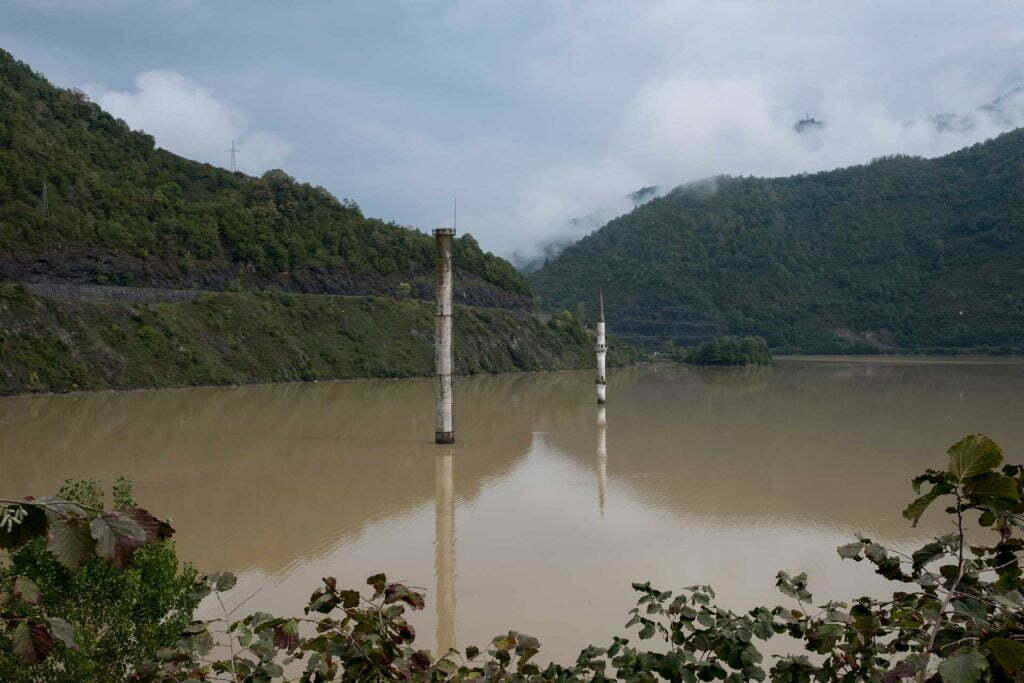CEMRE KARA
We set out towards the neighbourhood of Soğuksu in Beykoz. This is an effort to keep an account of the settlements on the banks of the Çoruh River, its people, and the lives that have been altered in the wake of the dam. We will meet with relatives of Tolga Odabaş of the Green Artvin Association (Yeşil Artvin Derneği – YAD), who were uprooted from Artvin Borçka and moved here. We arrive slightly early. Soğuksu is the kind of place that bears a striking resemblance to Artvin. There are houses sitting on a slope under a luscious green canopy, with hills leading up to them. Taken by surprise at feeling like we are in Artvin in a neighbourhood of Istanbul, we meet up with Kurtuluş Demirci. Kurtuluş abi is from Borçka’s village of Çavuşlu, and he now lives in Soğuksu. He tells us, “Wait till you see Dereseki, the people from Borçka are mostly there.” Together we head on to the neighbourhood of Dereseki slightly further up north in Beykoz. We arrive at the Dereseki coffee house – this is a true village coffee house if we’ve ever seen one. It is as if we are coming closer and closer to Artvin and the countryside on every step of the way from Soğuksu to Dereseki.

Sitting in the coffee house Kurtuluş abi runs into a relative of his, and thanks to this encounter we meet Şener Kocaman. Şener abi is from Karşıköy , a village in Borçka. Karşıköy is in close proximity to the Georgian border, and its inhabitants call it ‘Xeba’. The name ‘Xeba’ is thought to have come from ‘Heoba’, which means valley, pass in Georgian. Xeba, the centre of Karşıköy, is the first settlement to have been swallowed by the Muratlı Dam, which started generating energy in 2005. It is a village in name, but prior to being submerged under water it was in fact quite a town with its busy commercial and social life and constant flow of labour. The village (used to) consist of 13 neighbourhoods. While the central neighbourhood has (or rather, had) a more clustered settlement pattern, the remainder of the village sprawls out in dispersed fashion from the valley towards the mountainous terrain surrounding it. Before the waters came, the village used to boast a highly frequent minibus service and a steady influx of people due to the ÇAYKUR Tea Factory and military base located in its centre. Karşıköy also had a decently-sized wharf, and travelling by boat over the Çoruh river was a much preferred mode of transportation back in the day.
Şener abi was born and raised in Karşıköy. He decided to move to Istanbul in 2005, a move which he describes by saying, “We came out of necessity, we had to because of the circumstances. Are we happy? Of course not. It’s not like we were keen on coming here in the first place.” He tells us that he has no job opportunities here. He was a farmer in the village before coming. We ask him about the village, whether he misses it, how he remembers it. He responds
, “Did we ever forget our village even? Did we forget it to begin with? I haven’t even been able to go back in about a decade because of some troubles over here. Especially since I lost my father in 2007… Especially since then I haven’t felt like going. I really haven’t felt like it. But do we miss it? Of course we do. What did we do back home? There was tea and hazelnut that we grew. It wasn’t too much. Was it enough to keep us going? It most certainly wasn’t. Karşıköy is a tiny little place anyway. Were we happy? We were truly peaceful. Very peaceful. But as I said, circumstances and necessities forced us all the way here. Our life back there was confined to a tiny village, but were we truly happy? Yes, we were. But then in around 2000 the first land seizures began for the construction of the dams.”
While the Muratlı Dam was being constructed, an expropriation process began for the neighbourhood where the water would start pooling. “It all started with our village.” These were the words Tolga hoca used to tell us the story of the flooding of Karşıköy, the expropriation of their lands, all the money that was promised. People were asked to leave their homes in return for a certain sum offered as compensation for expropriation. The inhabitants of Karşıköy did not put up any resistance for their place of residence where water catchment was about to begin. The money they were offered proved tempting enough at the time. Şener abi tells us about how the compensation paid by the state for expropriation was in fact not adequate, but that those who sued for better compensation ended up with even lesser amounts than the original offer at the end of the court process. If the sum offered for one dunam (1000 square metres) was 20 thousand, those who went to court had to settle for 9 thousand or 11 thousand, he says. This information takes us by surprise, his eyes widen and he continues with a bitter smile on his lips. He tells us how people grew estranged from each other, how nobody could ask another for help: “It rotted people’s spirit, destroyed them mentally. There were many who spent the compensation money they received to the last dime over in Georgia, in Batumi, coming back to Borçka completely broke. It’s because people fell apart really, lost their senses when they saw the money. It went to their heads or whatever you call it. They went astray. 30% of the town lost everything they had in this manner.”

We’re curious about what happened to those who took the money and left the village. Were the compensations they received enough to start another home, another life? For it wasn’t just their homes that were being submerged under water by the dam, but their sources of income as well. Where were they able to go once they left their village? “You couldn’t buy an apartment in Borçka with that money you received. No way. It wasn’t enough because Karşıköy was listed as a village, not a town.” According to Şener abi, the government’s attitude in such matters is one of “Give them the required compensation and then leave everyone to their own devices.” He continues, “I don’t know to what degree anyone was able to make use of the situation, but the soul of the place was destroyed. It’s finished, and to be honest I don’t want to go there anymore. Because there is no sense of attachment or community. My mother is there; I would go for her. I would go for my sister and for my brothers. But if you were to ask me if I had any friends back there, no, none at all. Everybody is scattered; some have gone to Ankara, some to Istanbul, some to Bursa,” telling us about how the people of the village have dispersed all over the place.
Şener abi’s face is set in a subdued expression, I wonder if this is his disposition. It is clear that the thought of returning to his village visits him every now and again, and that he frequently questions whether there is anything left to connect him to the place. But he tells us that he has no desire to settle back in his village, that the place has lost its soul. He has a deep air of sorrow as he adds that he also has no expectations as to his new place of residence, and that he regrets ever coming here: “I have many fellow countrymen in Istanbul, but so what, where is the soul? What does it matter to have countrymen when there is no shared spirit? Where is the sense of commonality, the harmony?” he asks. He then tells us about ‘meci’. Apparently, meci means mutual help or cooperation in the Black Sea region. We talk about how the word may have derived from ‘imece’, which means ‘collective work’ in Turkish. A smile creeps across his face as he speaks of meci, despite everything setting his village apart from the big city of Istanbul: “We had it back home. But here you can’t find any meci. None at all. I could say so much about this place, but forget it. Forget it…”

I ask Tolga hoca as well: Are your relatives who came to Istanbul in a better way, do you think? He says, “They are so unhappy, their faces are those of people expecting death.” I think of Şener abi’s face. I hadn’t been able to find these words to describe it. I remember the moment we stopped in Karşıköy in September 2019. We were on our way towards Muratlı, towards the border along the Çoruh. When we saw the valley where the dam had held water we quickly got out of the car with an indescribable feeling mixed with surprise, unable to tear our eyes away from the water. When I looked to my right, I remember seeing a subdued, forlorn face a couple of paces away, marked with deep lines, clearly quite aged. A face like what I saw on Şener abi, like what Tolga hoca described. A pair of eyes watching the still water, as still as the expression on its face. We had run into a person, but there was more to it than that. This was a person who had clearly been dispossessed, displaced from his village, his home, his land, who had to watch this water day in and day out. Every day they watch their village centre that has been submerged from their brand new homes with a reservoir lake view. This time there is something different from other areas of settlement that have been flooded, something jutting above the surface, recalling memories of the place as not just water. There they are: a factory chimney and a mosque’s minaret.